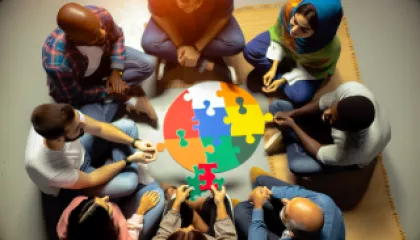Step-by-Step Guide to Debunking Common Mental Health Myths
There are numerous myths surrounding mental health that have persisted over time. These misconceptions often contribute to the stigma and discrimination associated with mental health conditions. This guide aims to debunk some of these common myths and provide accurate information about mental health. Let's dive into the step-by-step process.
Step 1: Understanding Mental Health
Before we start debunking myths, let's first establish a clear understanding of what mental health is. Mental health refers to our emotional, psychological, and social well-being. It affects how we think, feel, act, handle stress, relate to others, and make choices. Mental health is important at every stage of life, from childhood and adolescence through adulthood.
Significance of Mental Health
Mental health is as important as physical health in maintaining overall well-being. It affects various aspects of our lives, including productivity at work, relationships, and even physical health. Poor mental health can lead to severe conditions like depression, anxiety, and suicidal tendencies. Therefore, it's crucial to debunk myths that prevent people from understanding and addressing mental health issues properly.
Step 2: Identifying Common Mental Health Myths
The second step involves identifying the prevalent myths about mental health. Here are some common ones:
- Mental health problems don't affect me.
- People with mental health needs, even those who are managing their mental illness, cannot tolerate the stress of holding down a job.
- Mental health problems are the result of personal weaknesses.
- Children don't experience mental health problems.
- People with mental health problems are violent and unpredictable.
Step 3: Debunking Mental Health Myths
Now that we've identified the myths, let's debunk them one by one:
Myth 1: Mental health problems don't affect me
Debunked: Everyone is susceptible to mental health problems. They don't discriminate based on age, gender, race, or socio-economic status. It's estimated that nearly half of all people will experience a mental illness at some point in their lifetime. Furthermore, everyone goes through periods of stress, sadness, grief, and conflict, so even people who haven't been diagnosed with a mental health condition might still experience mental distress.
Myth 2: People with mental health needs cannot tolerate the stress of holding down a job
Debunked: People with mental health issues are just as productive as other employees. Employers who hire people with mental health problems report good attendance and punctuality as well as motivation, good work, and job tenure on par with or greater than other employees.
Myth 3: Mental health problems are the result of personal weaknesses
Debunked: Mental health problems have nothing to do with being lazy or weak and many people need help to get better. Many factors contribute to mental health problems, including biological factors, such as genetics, physical illness, injury, or brain chemistry, life experiences, such as trauma or a history of abuse, and family history of mental health problems.
Myth 4: Children don't experience mental health problems
Debunked: Even very young children may show early warning signs of mental health concerns. These mental health problems are often clinically diagnosable and can be a product of the interaction of biological, psychological, and social factors.
Myth 5: People with mental health problems are violent and unpredictable
Debunked: The vast majority of people with mental health problems are no more likely to be violent than anyone else. Most people with mental illness are not violent and only 3%–5% of violent acts can be attributed to individuals living with a serious mental illness.
Step 4: Spreading Awareness
Now that you've learned the truth behind these common mental health myths, it's your turn to help spread awareness. You can start by sharing this knowledge with friends, family, and colleagues. Remember, the stigma associated with mental health often prevents people from seeking help. By debunking these myths, we can help create a safe and supportive environment for those dealing with mental health issues.
Conclusion
Debunking mental health myths is crucial in fostering a better understanding of mental health issues and encouraging individuals to seek professional help when necessary. By following the steps outlined in this guide, we can all play a part in breaking down the misconceptions and stigma associated with mental health. Remember, mental health is just as important as physical health, and it's high time we started treating it that way.






